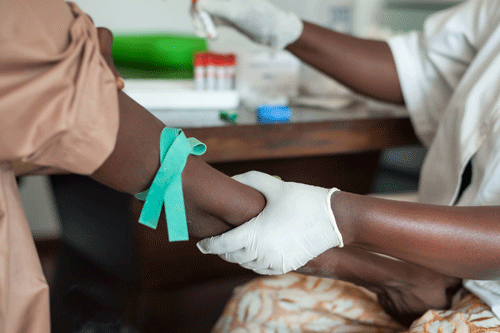Study shows how Ebola evolved during the outbreak in West Africa

University of Bristol researchers have played a key role in a new multi-national Ebola study published in Nature. The Ebola virus outbreak in West Africa has been going on for over a year and there have been fears about the speed of virus evolution, and the corresponding effect on vaccines, diagnostics and treatment. The research team used blood samples taken from patients and compared changes in the genetic material of the virus from throughout the outbreak. They were able to show that the outbreak had a single point of origin and predicted that diagnostics and treatment would be effective on the current form of the virus.
Dr David Matthews, Senior Lecturer in Virology from the School of Cellular and Molecular Medicine, who led the Bristol component of the study, explains: "These findings are important as they show whether the treatment and vaccination programmes in place have and will be effective in controlling what is, to date, the largest known outbreak of Ebola.
"We used Bristol's Supercomputer, Blue Crystal, to analyse raw data on the Ebola virus in 179 patient blood samples to determine the precise genetic make-up of the virus in each case. This allowed the team to examine how the virus evolved over the last year, informing public health policy in key areas such as diagnostic testing, vaccine deployment and experimental treatment options."
Professor Miles Carroll, the study lead, and Director of Research at Public Health England, Porton Down, said: "Our analysis shows the Ebola virus responsible for the current outbreak mutated at a similar rate to the earlier outbreaks in Uganda and the Democratic Republic of Congo. The results are good news for the scientists working to develop long-term solutions for Ebola, such as vaccines and treatments, as it means these new interventions should still work against the mutated strains of the virus.
"I have seen the suffering caused by this infection and our study has shown that the UK is at the forefront of developing methodologies to analyse patient samples. This capability has been in development for a number years with Dr David Matthews at the University of Bristol and colleagues at the University of Liverpool led by Professor Julian Hiscox, and has demonstrated its practicality in the Ebola virus outbreak."
The €1.8M study was funded by the European Union's Horizon 2020 programme and also involved researchers at the University of Edinburgh as well as from throughout the EU and Guinea. Key to the success of the study was the deployment to West Africa of the European Mobile Laboratory headed by Professor Stephan Günther at the Bernhard Nocht Institute in Germany. This pan-European effort included teams from Public Health England led by Professor Miles Carroll and deployed to Guinea to aid in the diagnostic effort in the earliest days of the Ebola virus outbreak.
The Bristol team greatly benefited from its Advanced Computing Research Centre and Research IT at Bristol who co-ordinated and developed the analysis on BlueCrystal. This complex data analysis process took around 560 days of supercomputer processing time, generating nine thousand billion letters of genetic data before reaching the virus's 18,000 letters long genetic sequence for all 179 blood samples.
More information: "Temporal and spatial analysis of the 2014-2015 Ebola virus outbreak in West Africa." Nature. 2015 Jun 17. DOI: 10.1038/nature14594


















